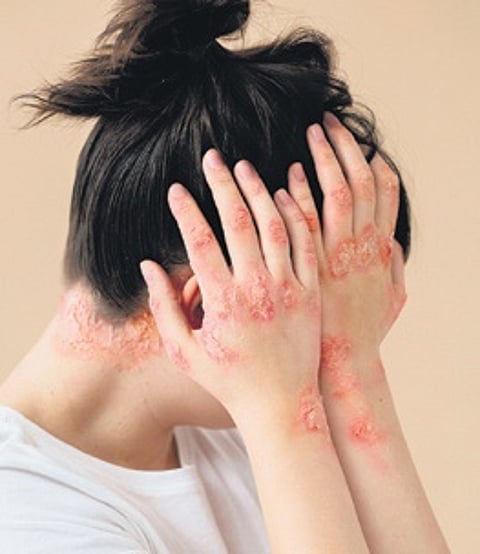

Biocon Biologics, one of India's leading biologic drug manufacturers, announced on Friday the results of a Phase-3 study on a biosimilar, bUstekinumab, demonstrating its equivalent efficacy to Janssen Pharmaceuticals' anti-psoriasis brand, Stelara. Stelara costs approximately $2,222 (around Rs 2 lakh) per treatment course.
"We are thrilled to share the pivotal Phase 3 study results comparing our biosimilar bUstekinumab with the reference product Stelara (Ustekinumab) in adult patients with moderate to severe chronic plaque psoriasis (PsO)," said the company, which will present the trial data at the ongoing 2025 American Academy of Dermatology (AAD) Annual Meeting in Orlando, Florida.
A biosimilar is a more affordable alternative to a biological drug, which typically remains under patent protection and is much more expensive. Since Stelara is imported and carries a high price, it is often inaccessible and unaffordable for patients in India.
Although Biocon Biologics has not yet announced the likely price of the drug in India, as it is too early and local approval may take some time, doctors expect the biosimilar (an injectible comes in 5ml vial) to significantly reduce treatment costs compared to the branded version.
The Phase-3 study, which represents the final trial phase for human drugs, demonstrated that bUstekinumab is equivalent in efficacy, safety, immunogenicity, and other treatment parameters to the reference product, Ustekinumab (Stelara). This marks a significant step forward in making therapies more accessible to patients globally.
Elena Wolff-Holz, Global Head of Clinical Development at Biocon Biologics, said in a statement, “The positive results from this Phase 3 study reaffirm the quality and therapeutic equivalence of YESINTEK compared to the reference product, Ustekinumab. This milestone underscores our commitment to providing cost-effective, high-quality biosimilars to patients with chronic conditions like psoriasis, expanding access to critical treatments globally.”
Psoriasis is a chronic inflammatory and proliferative skin disorder that primarily affects the skin, nails, and joints. According to a 2016 study (the most recent available), the prevalence of the disease in India was approximately 2.8%. While the exact cause remains unclear, it is generally believed to result from an overactive immune system that produces too many skin cells, leading to inflamed, scaly skin. Genetics and environmental factors are thought to play a significant role in the disease's development.
The safety and efficacy of the biosimilar were found to be comparable to Stelara throughout the study. The research also indicated that switching from the current medication to bUstekinumab remains both safe and effective.
A recent independent study by a group of veteran dermatologists and medical scientists, which reviewed the impact of biosimilars on the efficacy, safety, and accessibility of psoriasis treatments, concluded that biosimilars provide an overall effective, safe, and well-tolerated treatment option for patients. The study also highlighted that biosimilars are already offering substantial cost savings.
However, the study also noted that additional education is needed to address sources of ambivalence among both patients and providers, which will be crucial for the broader adoption of biosimilars.